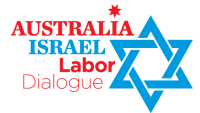Herbert Vere “Doc” Evatt served as a Member of the Parliament of New South Wales between 1925 and 1930.
In 1930, he was appointed a justice of the High Court in 1930 of Australia. He resigned to re-enter politics in 1940.
Evatt was a Member of the Parliament of Australia between 1940 and 1960. “Doc” Evatt” was the Australian Minister for External Affairs and Attorney General between 1941 and 1949. He was Leader of the Australian Labor Party between 1951 and 1960.
In 1960, Evatt was appointed Chief Justice of New South Wales.
The following extract describes in contribution to the creation of the State of Israel:
By 1947, when Britain referred the Palestine problem to the United Nations, the ALP government under Curtin’s successor Ben Chifley followed a more pro-Zionist policy. Evatt, for his part, was thoroughly sympathetic according to Michael Comay, the Jewish Agency envoy in Australia at the time, who met with both Chifley and Evatt.[12]
Australia was one of the eleven members of the UN Special Committee on Palestine (UNSCOP), which ultimately recommended partition by a vote of 7-3. Australia abstained from supporting either this recommendation or the alternative, a single federative state. Australia’s representatives to UNCSOP, John Hood and Sam Atyeo, personally opposed partition but Evatt ordered them not to state this publicly. Australia’s abstention was a function of Evatt’s belief, probably incorrect, that it was UNSCOP’s mandated role to engage only in fact finding, and making recommendations would compromise its neutrality.[13]
Evatt was then unanimously elected chairman of the Ad Hoc Committee on Palestine, set up in September 1947, as Evatt wryly put it, as an “investigation into the investigation” already completed by UNSCOP.[14] This was arranged, in part, as a consolation prize after losing a close contest with Oswaldo Aranha of Brazil to be president of the UN General Assembly.[15] Evatt skillfully used his role as chairman to see to it that partition was passed, by a vote of 25-13 with 17 abstentions, two months later.[16]
A Polish envoy to the United Nations, Dr. Julius Katz-Suchy, himself Jewish, later confirmed Evatt’s crucial role in securing partition to an Australian journalist. He reportedly said, “Ah, from Dr. Evatt’s country. Now that’s a great man for you…. Without him the Israelis would never have got in. He bullied, pleaded, cajoled, coaxed until he got the right numbers for them.”[17] Daniel Mandel, historian of Evatt’s role in Israel’s creation, endorses this as a “true and proportionate epitaph” for Evatt.[18]
Because of pressure from London, Australia followed Britain in withholding diplomatic recognition from Israel until January 1949. However, despite Britain’s preference to the contrary, recognition was extended de jure at this point, not de facto, as in Britain’s case.[19]
Following partition, in 1948, Evatt was elected president of the General Assembly, and Australia repeatedly submitted resolutions calling for Israel to be admitted as a UN member state. One such resolution failed in 1948, but another succeeded the following year.
Source: Jerusalem Center for Public Affairs






